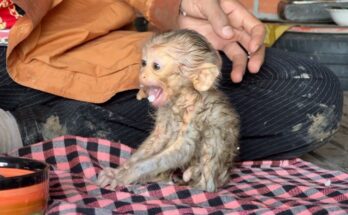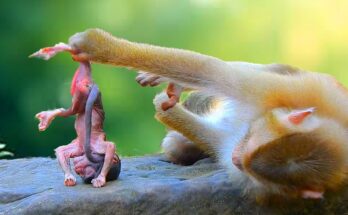Deep in the wild savannahs of Tanzania, the Hadzabe tribe continues to live as one of the last true hunter-gatherer societies on Earth. Their lives are deeply connected to the land, and every meal tells a story of survival, tradition, and nature’s gifts. Among the foods they prepare, one dish stands out for its rarity and cultural significance—boiled monkey.
In the heart of the forest, the Hadzabe men return from a successful hunt carrying a small monkey, caught using their traditional bows and poisoned arrows. While this may seem shocking to outsiders, to the Hadzabe, it’s part of their ancestral way of life. Nothing goes to waste. Every part of the animal is used for food, tools, or medicine.
After preparing the monkey by cleaning and removing the fur using fire, the meat is placed into a large pot with wild herbs, roots, and clean water. The pot is set over an open flame, and the aroma of boiling meat fills the air, attracting curious children and hungry adults. The scent is earthy, rich, and smoky—almost mouthwatering.
As the monkey simmers, the broth thickens, soaking up the flavors of the forest. When it’s ready, the elders are served first. The meat is tender, falling off the bone, and the soup is sipped slowly, warming the stomach. The Hadzabe eat with their hands, sharing from the same bowl, laughing and talking around the fire. To them, this is not just a meal—it is a celebration of nature’s bounty and their bond with the wild.
To an outsider, it might seem strange or even uncomfortable. But for the Hadzabe, this dish represents survival, tradition, and respect for the natural cycle of life. The boiled monkey, rich in protein and taste, is a rare delicacy in their world—one that looks surprisingly delicious through their eyes and culture. In the end, it reminds us how diverse, complex, and beautiful human life can be, even when shaped by the harshness of the wilderness.


